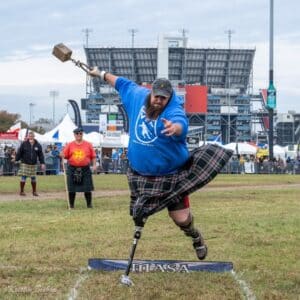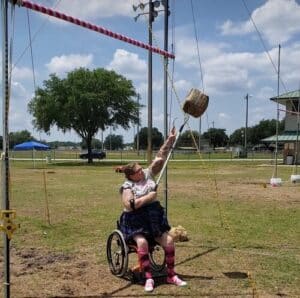
By Jewel Connelly, Communications Specialist
The Highland Games have a rich history which traces its roots as far back as the 11th century, but you don’t have to be of Scottish ancestry to partake in these traditional events. If you are seeking a truly cultural experience (and open to sporting a kilt!), it may be time to consider giving adaptive Highland Games competition a try. Since Matt Hall started competing at 37 years old as an amputee athlete, he has found the Games to be the most supportive community he has ever been a part of, and the journey led him to found Broken Caber Adaptive Athletics.
Scotch-Irish himself, Matt had his first encounter with the Highland Games as a student at Radford University in Virginia. Although it wasn’t until 15 years later after attending the Radford Highlanders Festival that he really learned about the Highland Games and began competing in 2017. Just a year later he had the opportunity to compete in the first adaptive class in Scotland and became the first recorded adaptive athlete to ever throw in Scotland.
Opening up a new opportunity for adaptive athletes in Scotland prompted the President of the Royal Scottish Highland Games Association to request that Matt write classifications to be used for future adaptive divisions. The four existing classifications for Highland Games that were decided upon (seated, lower injury, upper injury, neuromuscular) are based off the Paralympics and Broken Caber was established as an advisory group to aid in putting adaptive classifications on the rulebooks around the world. The rules are currently being used on five continents (Europe, North America, South America, Australia, Asia) and since their inception have become the standard for adaptive Highland Games competitions.
Although given the physical nature of the sports, they are supposed to be challenging, but with proper strength training and the flexibility to adjust the weights both men and women can compete. “There is a certain level of strength required, but most adaptive athletes who train regularly will be able to do each event,” Matt emphasized. “Most adaptive or able-bodied athletes will do all their throws in the first Games without moving.” There are nine events in the Highland Games with adjustments being made to the weights in adaptive classes. These events include: the Braemar stone (stationary throw), Open Stone (shot put style), Heavy Weight and Light Weight for Distance (weight on a ring, spin and throw), Heavy and Light Hammer Throw (thrown over shoulder), Caber Toss (pole toss), Weight for Height, and the Sheaf Toss (burlap sack thrown with a pitchfork for height). The unique part about this sport is that competitors don’t have to participate in all nine events or do all three throws per event. “The sport is as adaptable as you want it to be,” Matt said.
 One struggle that the sport has had is attracting new adaptive athletes and getting them to enter adaptive classes that are opening at Highland Games festivals across the country. Part of what Matt is doing with Broken Caber is starting conversations and showcasing demos to increase awareness and get more people involved. If you crave competitions of strength and an element of danger, the Highland Games may be a good fit and a unique way to strengthen your body as an amputee. “The need for strength training specific movements works directly on the movements that many adaptive athletes struggle with; balance, speed, and coordination,” Matt shared.
One struggle that the sport has had is attracting new adaptive athletes and getting them to enter adaptive classes that are opening at Highland Games festivals across the country. Part of what Matt is doing with Broken Caber is starting conversations and showcasing demos to increase awareness and get more people involved. If you crave competitions of strength and an element of danger, the Highland Games may be a good fit and a unique way to strengthen your body as an amputee. “The need for strength training specific movements works directly on the movements that many adaptive athletes struggle with; balance, speed, and coordination,” Matt shared.
Matt has worked as both a wrestling and CrossFit coach and founded Wandering Lost Adaptive Sports which offers coaching in powerlifting, strongman, Highland Games, CrossFit as functional fitness, competitive CrossFit, and general strength training for health. As Head Coach at Wandering Lost along with other experienced adaptive coaches, Matt and his team coach adaptive athletes for free as they train for Highland Games and other strength competitions. “We coach Highland Games athletes in stages, along linear progressions until they are proficient in each event,” Matt explained. “Being able to work on the events separately but support several events with focused training movements gives adaptive athletes a blueprint for tackling most of life.”
If you are interested in learning more about how to get started, visit Broken Caber’s website and follow them on Facebook and Instagram (@brokencaber).

